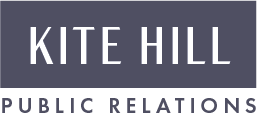With a news cycle dominated by COVID-19, it’s a good time for organizations to ensure that their technology and messaging are updated to reflect the new normal.
At Kite Hill PR, we’re guiding our clients through this introspectively, while continuing to advance proactive business communications; albeit with carefully considered messages viewed through a COVID-19 lens.
With this backdrop, here are three important considerations we are counseling our clients to think about, and are relevant to most businesses and organizations, as they communicate during this unprecedented time.
Message points are more important than ever.
While it’s always a best practice to have your key messaging points prepared ahead of time, during times of crisis, this is essential to avoid being viewed or misconstrued as insensitive or an opportunist capitalizing on tragedy. When developing key messaging, keep it brief and factual, leaving no room for interpretation. These talking points should serve as your anchor, keeping the conversation from wandering too far away from your main topic.
Prepare yourself and your environment.
As all interviews and other media opportunities are being conducted by phone or video conferencing tools like Slack or Microsoft Teams, many subject matter experts are doing them from their homes; a setting that might not be conducive to anything more than a quick phone call or an internal company meeting. When preparing for a video interview, limiting distractions and possible technical difficulties are your top priority. During the interview, you’ll want to mute all notifications and close unnecessary windows on your computer and make sure to prepare your environment prior to the event. At minimum, you should ensure:
Your connection is stable
You have headphones or know there’s no echo or background noise
Your camera picture is clear with good lighting
There’s nothing/no one in the background that could become a distraction
The same rules regarding distractions, connection and noise apply for phone interviews as well. We urge all of our clients to treat phone interviews with the same level of care that you would an in-person or video interview. You’d be surprised how well body language or distraction translates over the phone.
Be sure to practice.
Just as important as developing clear messaging points is ensuring you're comfortable discussing them with confidence. Setting aside time to have a mock interview, recording yourself going over your talking points or practicing in front of a mirror are all great ways to prepare for a speaking opportunity. Very rarely is “winging it” a good idea, and in the midst of this heightened societal climate, it pays to be prepared or you can risk coming off as unprepared or insensitive. Standard rules such as talking slowly and avoiding industry jargon and acronyms still apply, but also take time to either prepare answers or brief responses about the current climate that show thoughtfulness and the appropriate sensitivity.
These few tips will go a long way in helping you prepare for an interview, but the best advice we can give is to relax and be confident. The interview doesn’t happen without you, it’s your time to promote your message. If you take the time to prepare, speak with conviction and be cognizant of your audience you will be fine in any climate.
- Jacob Lawrence, Account Associate
